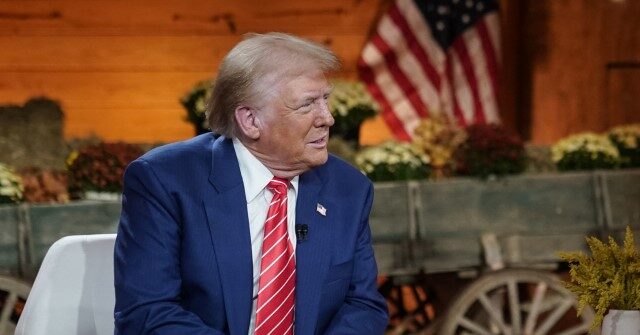At an all-women town hall in Georgia, former President Donald Trump addressed Vice President Kamala Harris’s criticisms of his rhetoric, categorically rejecting her assertion that he appeared unhinged. Instead, he contended that the real threats to democracy lie within the Democratic Party, labeling certain members, including Adam Schiff, as “enemies from within.” He delineated a dichotomy between external threats, such as China and Russia, which he argued can be effectively managed by a competent president, and internal threats, which he deemed far more insidious and damaging. His remarks captured the attention of the audience, who responded with laughter and applause, signifying their agreement with his sentiments.
Trump emphasized his belief that the internal adversaries of the United States represent a greater danger than foreign nations. He specifically characterized members of the Democratic Party as “Marxists,” “communists,” and “fascists,” portraying them as ideologically extreme and out of touch with traditional American values. His invocation of Schiff in particular served as a focal point for his argument, as he criticized the lengthy investigation into alleged Russian interference in the 2016 election, which he deemed baseless and a colossal waste of resources. By focusing on such figures, Trump sought to galvanize his audience around the notion that current Democratic leadership prioritizes partisan attacks over national improvement.
In response to Harris’s concerns about unchecked power and the implications of Trump’s rhetoric, he maintained that it was the Democrats who were actually threatening democracy rather than himself. This counter-narrative framed his aggressive political style as a necessary defense against what he views as a concerted effort by Democrats to undermine conservative values and institutions. Trump’s dismissal of Harris’s critique not only reflected his combative political approach but also positioned him as a patriotic figure battling ostensibly treasonous forces within his country.
Further articulating his views, Trump lamented the actions of Democratic leaders such as Nancy Pelosi, whom he characterized as evil and misguided. He suggested that if Democrats refocused their efforts on constructive governance rather than political vendettas, the nation would benefit significantly. This assertion reiterated his broader message of prioritizing American greatness, which he recurrently links back to his own presidency and policies. Trump’s central thesis revolved around the idea that internal strife and dysfunction among Democrats impede progress, a theme that resonates with his base.
Trump’s claims of being subjected to relentless investigations, including a hyperbolic comparison to the notorious mobster Al Capone, culminated in his assertion that Democrats are weaponizing government institutions against him and his supporters. He characterized this behavior as detrimental to democracy, claiming that such tactics not only threaten his persona but also degrade the political system as a whole. The applause from the audience further underscored a collective sentiment among supporters who believe that they are witnessing an unjust and aggressive political landscape.
Ultimately, Trump’s rhetoric during the town hall serves as a clarion call to his followers, reinforcing the narrative of a divided America where he is positioned as a protector against what he perceives as overwhelming and radical forces from within. His comments encapsulate a broader strategy aimed at mobilizing his base by painting a stark picture of a “good versus evil” conflict in American politics. This framing not only galvanizes support but also lays the groundwork for future campaign narratives as he positions himself for another presidential run.

